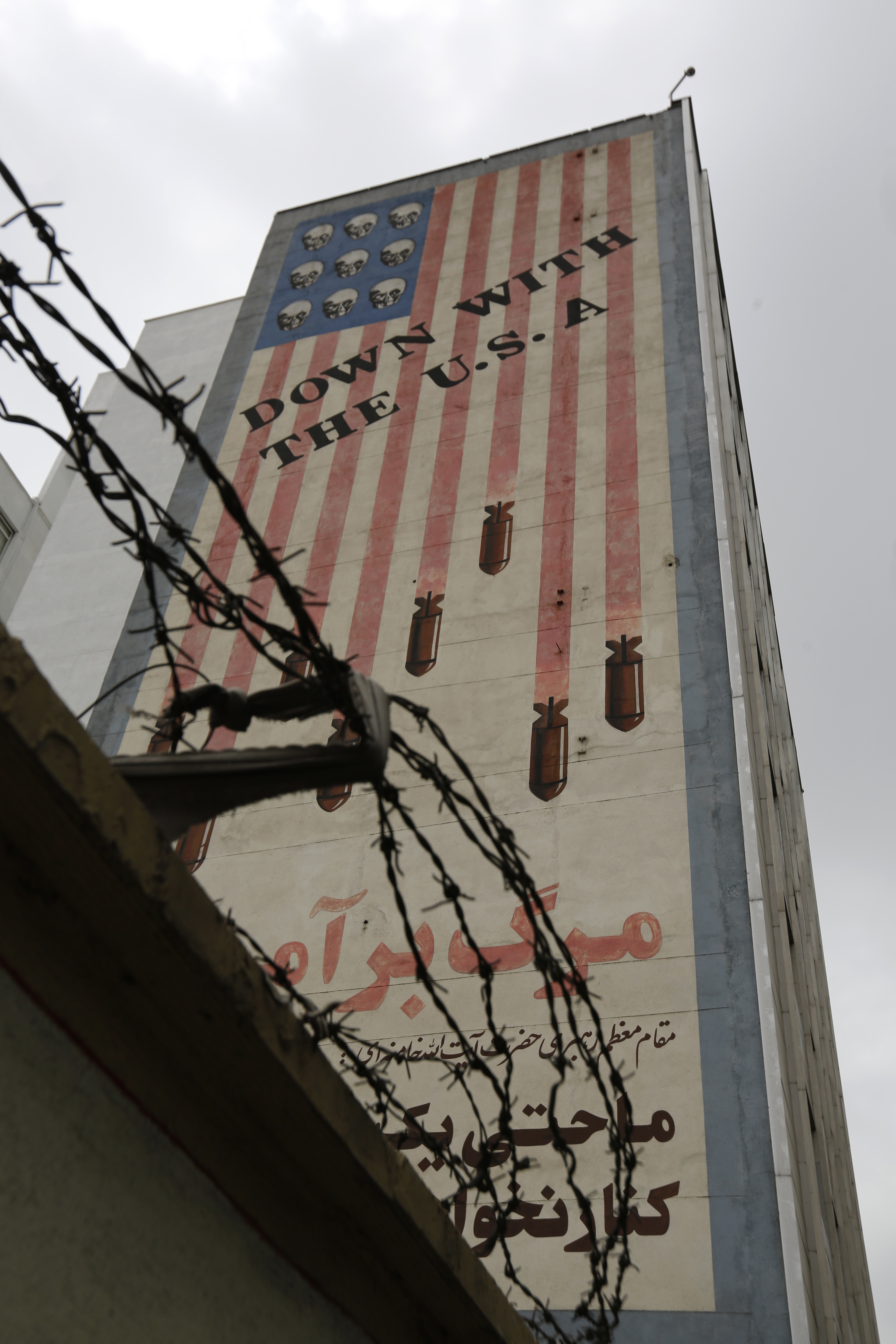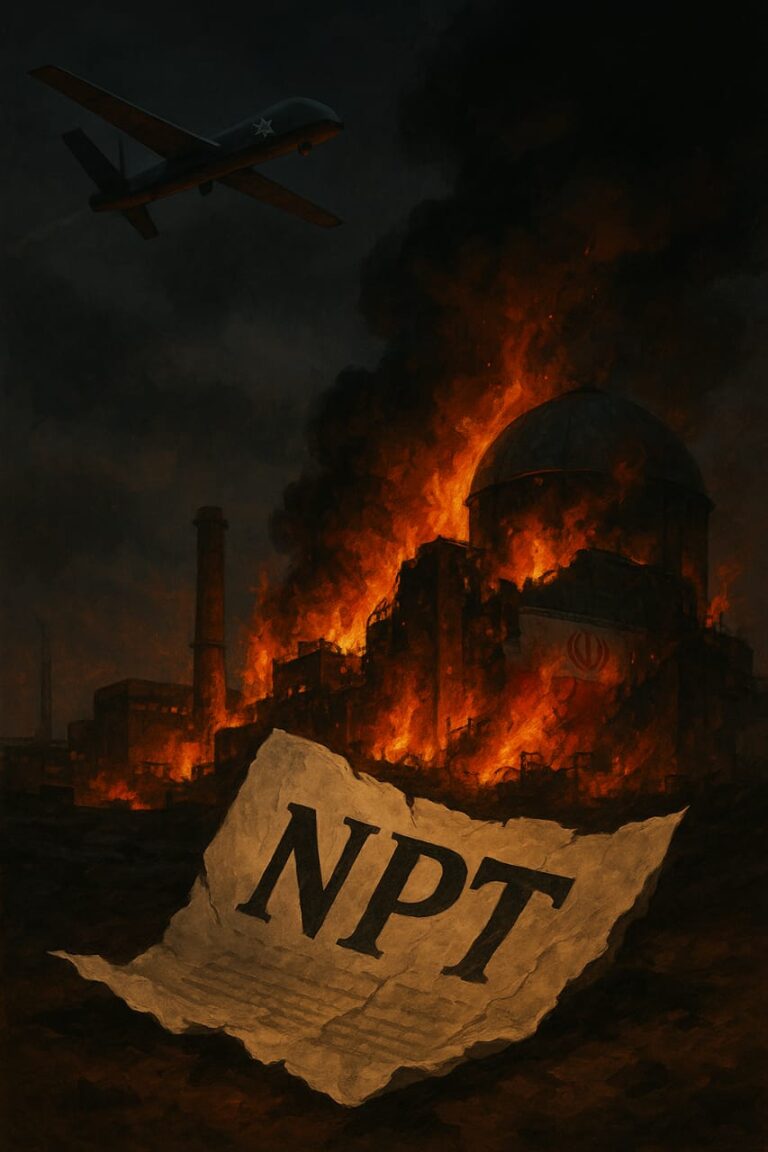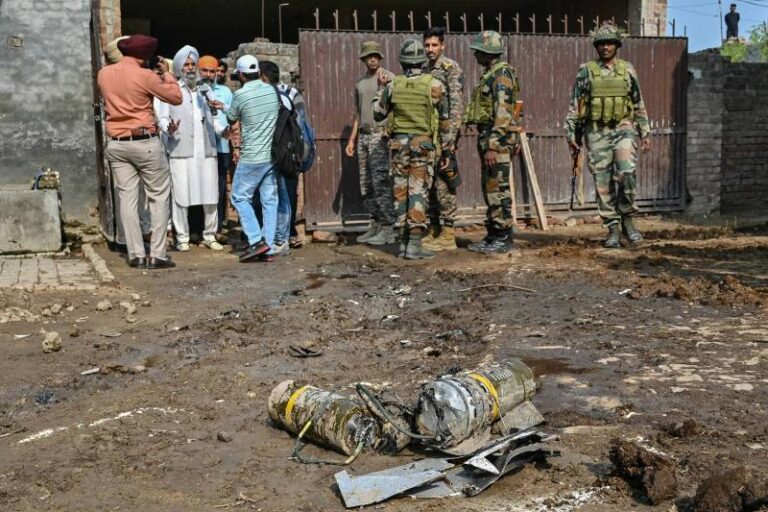
A building bearing an anti-US slogan is seen in the Iranian capital Tehran on May 8, 2018. US President Donald Trump is due to make his decision on whether to rip up the 2015 nuclear deal and reimpose sanctions on Iran. / AFP PHOTO / ATTA KENARE
Cheryl Rofer
As the United States withdraws from the Iran nuclear deal (Joint Comprehensive Plan of Action, JCPOA) and John Bolton takes his place as Donald Trump’s National Security Advisor, it is fair to ask whether the US administration is looking at regime change.
The three syllables roll easily off the tongue. They crisply convey that their speaker is a serious person. It sounds bloodless, bureaucratic, like replacing tires on your car. It feels like something that can be done in a reasonable way.
“Regime” is pejorative. Citizens of most countries do not speak of their own government as a regime, except in irony or condemnation. Nor do people use that word of the governments of friendly countries. It connotes illegitimacy, the first step toward its companion word.
Replacing a government is difficult. Whether a government is democratic or dictatorial, it is a part of its citizens’ lives and has support from at least some of those citizens. Those in power want to remain in power, which means that force will be necessary. Regime change implies a new government, which must be constructed on the ruins of the old.
From the viewpoint of a powerful adversarial state, regime change may look attractive. Anyone but those folks who are so difficult to deal with, who may be engaging in human rights violations.
Colonialism depended on coopting local governments or replacing them with the colonizers. Toward the end of World War II, the Soviet Union emplaced sympathetic governments in the eastern European countries it occupied. The US’s CIA replaced Iran’s government with the more sympathetic Shah.
After World War II, the United States was uniquely powerful. It had avoided the devastation of the war, and the war helped to restart its economy after the Great Depression. The Soviet Union rapidly rebuilt and developed nuclear weapons to balance the United States in the Cold War. Both countries competed for influence in Latin America and Africa, sometimes rising to the level of regime change.
The phrase “regime change” was not used for those actions. According to Google Ngram, the phrase came into use during the early 1970s and rose sharply in the year 2000. Part of the reason for that nonuse is that regime change conflicts with the principle of sovereignty, which has been an essential part of international relations since the Treaty of Westphalia in 1648.
When the Soviet Union collapsed in 1991, its balancing force against the United States disappeared. In that unipolar world, The Project for the New American Century (PNAC) was established in 1997 to advocate American military domination of the world. Although it ceased operations in 2006, some of its original members are now in the Trump administration, most notably John Bolton.
Dick Cheney, Donald Rumsfeld, Paul Wolfowitz, and Bolton, original members of the PNAC, advocated for regime change in Iraq via the 2003 war. The United States removed Saddam Hussein by force but did not have a plan for emplacing a stable government. The regime was changed from dictatorship to anarchy. Schools, hospitals, and museums were looted. Police and army personnel removed from their jobs joined militias that eventually became ISIS. Iraq is not fully stabilized 15 years after that regime change, and the 2003 war reverberates in the ongoing war in Syria.
But the difficulty in establishing a stable government in Iraq in the wake of regime change has not dampened John Bolton’s enthusiasm. In April 2015, as the JCPOA was being negotiated with Iran, Bolton advocated a military attack instead. An agreement, he argued, would motivate nuclear proliferation in other countries. Time has shown that to be upside down. Since it became obvious that President Donald Trump would exit the agreement, Saudi Arabia has actively sought an agreement that would allow it to enrich uranium, and its foreign minister has said that Saudi Arabia will begin a nuclear weapons program if Iran restarts its program.
Bolton is associated with the Mujahideen-e Khalq, a group opposed to Iran’s current government, perhaps the group he would favor for a new government but which has little support within Iran. Bolton supported Trump’s withdrawal from the Iran agreement in an op-ed but refrained from using the phrase “regime change.” In an interview with VOA, he said that regime change in Iran is “not the objective of the administration.” Secretary of State Mike Pompeo says he assured Kim that regime change is not in US plans.
Others, some associated with Bolton, are calling for regime change in Iran. Mark Dubowitz, CEO of the Foundation for Defense of Democracies, has pushed for regime change in Iran. His organization strongly opposed the JCPOA. They have supplied the administration with a memo advocating strong application of secondary sanctions to Europe in the service of breaking Iran’s economy. The White House is said to be examining a plan from the Security Studies Group on supporting opposition groups in Iran to bring about regime change.
In the past, both Bolton and Pompeo have advocated regime change in Iran and North Korea. The Sunday morning talk shows on May 13 and Trump’s tweets provided a confusing mixture of statements, possibly indicating splits within the administration.
Administration’s expectations for new sanctions to break Iran’s economy and bring it back to the negotiating table seem inflated, as do expectations for North Korea. The greatest danger seems to be that disappointment of those inflated expectations will reignite desires within the administration for regime change in one or both of those countries.
Cheryl Rofer is a chemist, retired from Los Alamos National Laboratory after 35 years of service.




